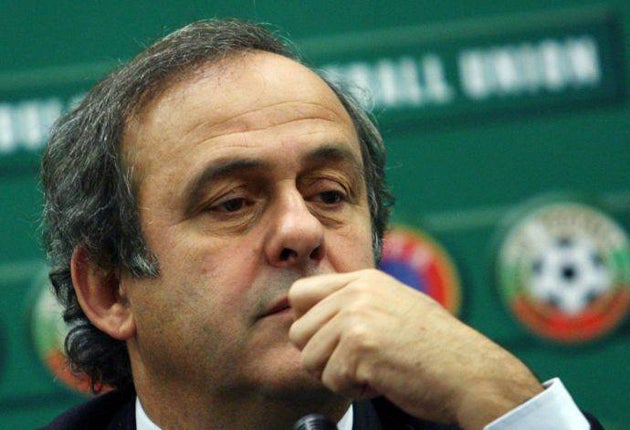Platini: Media persecution of Fifa could harm England bid
'Years of press criticism' threatens hope of hosting 2018 World Cup

Your support helps us to tell the story
From reproductive rights to climate change to Big Tech, The Independent is on the ground when the story is developing. Whether it's investigating the financials of Elon Musk's pro-Trump PAC or producing our latest documentary, 'The A Word', which shines a light on the American women fighting for reproductive rights, we know how important it is to parse out the facts from the messaging.
At such a critical moment in US history, we need reporters on the ground. Your donation allows us to keep sending journalists to speak to both sides of the story.
The Independent is trusted by Americans across the entire political spectrum. And unlike many other quality news outlets, we choose not to lock Americans out of our reporting and analysis with paywalls. We believe quality journalism should be available to everyone, paid for by those who can afford it.
Your support makes all the difference.Michel Platini has dismissed fears that recent newspaper allegations of corruption among Fifa delegates will diminish the chances of England landing the 2018 World Cup but the Uefa president admitted that the long-term criticism of the world game's governing body in the English media "could be a problem" when the 2018 venue is chosen on 2 December.
In an exclusive interview with The Independent, published tomorrow, the head of the European game's governing body said it was the years of attacking Fifa in the press that was more likely to harm England's bid than the investigations into the pair who were suspended from voting on the 2018 and 2022 World Cup hosts by Fifa yesterday. Fifa's ethics panel banned Nigeria's Amos Adamu from all football activity for three years for agreeing to take bribes in return for his vote from undercover Sunday Times reporters. Reynald Temarii of Tahiti was suspended for one year for breaching Fifa's loyalty and confidentiality rules. Both were also fined, while four other lesser officials were banned or suspended. The scandal will be addressed today in a meeting of Fifa's executive committee, of which Platini, as a vice-president of the world governing body, is a member.
"I don't think it's a problem," Platini said. "These investigations are just people doing their job, no? If they [those spearheading the England bid] do not have a good feeling about Fifa, that's nothing to do with these investigations, but that comes from what the English press have been writing about Fifa for very many years. That could be a problem for the bid. But this? No.
"Why not [make the allegation of corruption], if it's there? Anyway, I think people have already decided which way they are voting."
In a remarkably candid interview, Platini also pointed to match-fixing as the biggest threat to the game's future. He said that football's other problems, such as financial recklessness, endemic racism, crowd violence and drug-taking, are less serious than the dangers posed by the betting cartels able to rig results. "Yes, we have problems with violence, with racism, with doping," he said. "But to fix a game is to attack the soul of football."
Platini acknowledged that irregular betting patterns had brought certain matches to the attention of Uefa. "If €500,000 is bet on a three-goal difference, and it is 1-1 five minutes before the end, and the game ends 4-1, then something is going on," he said, without revealing whether he had a particular match in mind. Uefa has an "early warning system" in place to monitor unusual waves of betting, which according to Platini costs €9m a year to operate. But football's own safeguards are inadequate without the strong support of individual police forces, he said. "I am the president of Uefa, not Scotland Yard. I need help."
Even with such help, there are still several European countries in which match-fixing is not a criminal offence, which complicates an investigation process that is challenging enough to start with. "You know, I scored 400 goals in my career," said Platini, who played for Nancy, St Etienne, Juventus and France and was one of the greatest players of his or any era. "That's 400 goalkeeping mistakes. You can't investigate every one. And I'm not against betting. You have had betting in your English culture for many years. It is not so in France. But I don't mind betting. I mind match-fixing. It is a big problem."
He added that he wants the greatest legacy of his Uefa presidency to be the Financial Fair Play regulations, which are being introduced over three years, and are intended to prevent the kind of financial recklessness that has so crippled Portsmouth, among other clubs. But one innovation he remains determined to oppose is goalline technology. "If we put in video technology, people will come back in two years and say 'why isn't there technology for the whole penalty area?'" he said. "Then they will say 'why isn't there offside-line technology?' Then it becomes another game, not football."
In The Independent tomorrow: Michel Platini tells Brian Viner about England's chances of hosting the World Cup and his fears for the game's future
Join our commenting forum
Join thought-provoking conversations, follow other Independent readers and see their replies
Comments